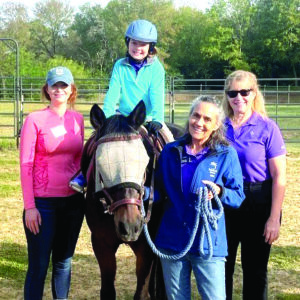By Dr. Beth Leermakers
Horse kisses: the best medicine in the world.
Horses are wonderful stress relievers. Brushing a horse’s tail or bathing him (while getting dirty in the process) has always been a calming, grounding experience for me. Horses are also powerful healers for children and adults with physical, cognitive and emotional needs.

Photo courtesy of Equest
Therapeutic horseback riding includes Equine-Assisted Therapy (EAT) and Hippotherapy.
Equine-Assisted Therapy. According to Psychology Today, equine-assisted psychotherapy, also called EAT, “refers to activities with horses that are conducted while being supervised by a mental health professional and a horse trainer or other equine specialist.” EAT is used to treat anxiety, attention-deficit/hyperactivity disorder (ADHD), eating disorders, addiction, depression and many other mental health conditions. EAT is theorized to help patients build confidence, self-awareness and empathy.
Hippotherapy. Hippotherapy is a physical, occupational and speech therapy that uses a horse’s movement to provide motor and sensory input. Hippotherapy improves neurologic functions and sensory processes for patients with neurological or other disabilities, such as autism, cerebral palsy, arthritis, multiple sclerosis, head injury, stroke, spinal cord injury, behavioral disorders and psychiatric disorders.
Why use horses for PT/OT?
1. A horse provides a rhythmic motion that stimulates swinging movements by the rider.
2. The horse’s movements encourage the rider to achieve proper balance and posture.
3. The horse and handlers give the rider a large range of sensory and motor input. The horse’s movement provides sensory input to the vestibular (related to balance), proprioceptive (related to perception of joint position and movement), tactile and visual senses.
Five Benefits of Therapeutic Horseback Riding
Studies show that EAT and Hippotherapy provide several benefits for individuals with physical, developmental and intellectual disabilities.
Therapeutic riding
1. Improves motor skills in children with cerebral palsy, autism spectrum disorder (ASD) and ADHD. One study found that horseback riding, combined with mental exercises, improved the motor skills (manual dexterity, strength and upper-limb coordination) of children and adolescents diagnosed with autism, ADHD and other neurodevelopmental disorders.
2. Improves communication skills and the ability to form relationships in children with ASD. The bond that autistic children form with their horses can be a bridge to better social or communication skills. One study found that 42 children with ASD who participated in a 16-week therapeutic riding program (hippotherapy) had significant improvements in social interaction and communication skills.
3. Increases sensory awareness. A study found that an 8-week equine-assisted OT program improved sensory integration for autistic children.
4. Helps build the skills needed for walking. The rider’s pelvis sways on horseback, simulating the walking motion. Riding serves as physical therapy.
5. Builds confidence and patience. Combat veterans with post-traumatic stress disorder who participated in an 8-week therapeutic horseback riding program reported greater confidence, gratitude, hope and patience.
Equest: Therapeutic Riding in Southeast Dallas
Equest (equest.org) offers several programs for children and adults with physical, cognitive, sensory, emotional and learning disabilities:
Therapeutic riding and carriage driving. Therapeutic riding instructors teach equestrian skills to participants with special physical, cognitive, sensory, learning, social, or emotional needs. Individuals who can’t or don’t want to mount a horse can participate in EAT while riding in a carriage.
Hippotherapy (PT/OT). Licensed professionals provide physical, occupational, and speech therapy using the movement of the horse to accomplish therapy treatment goals.
Equine facilitated counseling. Clients work with a licensed mental health professional, a certified equine specialist, and a therapy horse/herd to accomplish counseling goals.
Want to spend time with horses and make a difference in people’s lives?
Help in class. Lead a horse, maintaining his pace, calmness and focus. Or be a side-walker who assists the rider. Volunteers must be at least 14 years old and complete volunteer training.
Help in the barn. Volunteers feed the horses, take them to/from the paddocks, clean the barn and muck stalls. Volunteers who are 12 or 13 can help, if a parent participates with them at first. Volunteers may help in the barn before they attend the training session.
Equest is having a Holiday Open House on Saturday, Dec. 2. The next volunteer training session is on Saturday, Jan. 20, with another session on Jan. 27. Visit equest.org/training to learn about all the events.
Equest volunteers can even sign up for riding lessons. Let the good times walk, trot and canter!
